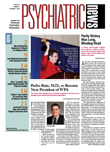Sometimes a perfect storm, or a confluence of influence, can be a good thing. Last March, the APA Board of Trustees began a process of self-examination about the relationships between APA and the pharmaceutical industry, a topic about which many of our members have been concerned. Jeffrey Geller, M.D., chairs a work group that has prepared a report for the Board offering options for the reduction of pharmaceutical funding over the next five years. The work group began with a breakdown of the kinds of relationships we have and of the activities on which we spend that money—and your dues. The APA staff were extremely helpful in putting this information together.
Several months after our work group began its task, the media erupted with stories alleging that prominent physicians, most of them psychiatrists, had received, and not reported to their institutions, large sums of money. Many of us get questions about these media reports from relatives, friends, and patients. Most of these allegations remain unresolved.
As you know, members' feelings about funding by pharmaceutical companies vary a great deal depending on what the money is meant for. Most members have no objection to pharmaceutical advertising in our journals and Psychiatric News. The exhibit halls at our meetings are another means of advertising. They are set off from the scientific sessions, but some members find them inappropriate. Industry-supported symposia arouse the most controversy. Among the members I've heard from, most have negative feelings about them, but others consider them the high point of the meetings.
While we were analyzing our relationships with industry, organizations including the Association of American Medical Colleges and the AMA were addressing the issue of pharmaceutical funding of undergraduate, graduate, and continuing medical education. Each recommended a significant diminution or cessation of that funding. These decisions do not come without resistance; the AMA House of Delegates sent back its council report for further consideration.
Our sister specialty organizations are weighing the merits of the relationships between their associations, their individual members, and industry. The American College of Obstetricians and Gynecologists has adopted a policy that no member of its board may receive money from pharmaceutical companies except for the conduct of multicenter trials. The American Association of Orthopedic Surgeons has developed a set of standards and an online educational module to help their members talk with their patients about any relationships they have with companies that manufacture artificial joints and other orthopedic devices.
Overall, as the politicians say, my mail is running heavily against pharmaceutical support, mainly of APA educational activities, but perhaps of other activities as well. At the same time, the United States and world economies have been in turmoil. Many members, including me, are concerned about their practices, loans, mortgages, children's educations, and retirements. That's the final element of the perfect storm.
So we have to prioritize. We want to minimize our use of reserves. We spend $3.2 million of our income on governance: the Board, the Assembly, and the components (committees, councils, and so on). The rest goes to member services, education (professional and public), and the kind of research that directly affects our work.
As with pharmaceutical funding, members have strong feelings about governance. We have a lot of governance; few other specialty societies have an Assembly, and none has as many committees as we have. Each requires staff. Each brings members together and involves them directly in the workings of APA. The loss or downsizing of any of them would undoubtedly upset those dedicated members and deprive us of their contributions, but it would save a considerable sum of money. Ronald Burd, M.D., the speaker of the Assembly, and I have appointed a work group (these work groups are functioning by means of electronic communication) to consider changes in our governance. You can access the list of components in the Members Corner section of APA's Web site at<www.psych.org>.
I need to know what you think we should do. I may not be able to continue to respond personally to each of your messages, but I will read them and convey your feelings to your Assembly and your Board, which has the ultimate responsibility to carry out your wishes. It's your APA; let's put this perfect storm to good use. ▪

